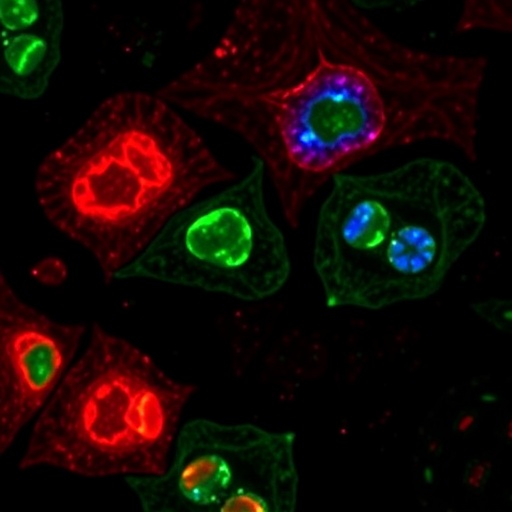In a groundbreaking study, researchers have explored the potential of probiotic derivatives of Bacillus coagulans Hammer in facilitating apoptosis in colorectal adenocarcinoma cell lines in vitro. The significance of this research lies in the increasing incidence of colorectal cancer and the urgent need for novel therapeutic strategies that are both effective and safe. The innovative use of probiotics represents a promising frontier in cancer therapy, merging microbiological insights with oncological applications, and can potentially revolutionize the approach to treatment.
Recent advancements in microbiome research have unveiled the complex symbiotic relationships between gut bacteria and host health. Probiotics, which are live microorganisms that confer health benefits when consumed in adequate amounts, have shown potential in enhancing immune responses, moderating inflammation, and even exerting antiproliferative effects on various cancer types. This particular study sheds light on how Bacillus coagulans, a well-known probiotic, could induce programmed cell death in cancer cells, marking a significant step toward exploring bacterial derivatives as viable cancer therapeutics.
The methodology employed in this study is noteworthy. The researchers utilized colorectal adenocarcinoma cell lines, which are often used in cancer research to provide insights into the mechanisms of tumor growth and drug response. By introducing derivatives of Bacillus coagulans, the scientists monitored apoptosis through various assays, analyzing morphologic changes and measuring biochemical markers indicative of programmed cell death. Such rigorous experimentation underpins the credibility of their findings.
Previous investigations into probiotics have mostly concentrated on their health benefits related to digestive health and immune function. This study, however, transcends conventional knowledge to explore an uncharted area—the intersection of probiotics and oncology. By demonstrating that Bacillus coagulans can influence cellular pathways associated with apoptosis, the researchers have opened a promising avenue for future cancer treatments. This is especially relevant as traditional therapies often come with a plethora of side effects and lack specificity.
The neurobiological implications of probiotics continue to attract attention, especially their potential to modulate the gut-brain axis, which may influence not just gastrointestinal health but also psychological well-being. In the context of cancer, the stress of diagnosis and treatment can alter gut microbiota composition, thus creating a vicious cycle. This study suggests that Bacillus coagulans could play a dual role, enhancing gut health while directly impacting cancer cell viability, hinting at a multifaceted approach to therapy.
Equally important is the accessibility of probiotics as a treatment option. Unlike synthetic drugs that require complex manufacturing processes, probiotics can potentially be administered through dietary means or supplements. This accessibility could lead to increased patient compliance and a broader acceptance of adjunctive therapies in oncology settings. The economic burden of cancer treatment typically weighs heavily on patients and healthcare systems, highlighting the urgent need for cost-effective, accessible alternatives.
The use of probiotics in cancer therapy is not entirely novel, as there have been prior studies hinting at the anticancer effects of various strains. However, the strength of this study lies in its specific focus on Bacillus coagulans derivatives and the novel mechanisms through which they exert their effects. By clarifying the apoptotic pathways activated by these probiotics, the researchers are laying the groundwork for more extensive clinical trials and ultimately, patient treatment regimens.
Another compelling aspect of this research is its potential implications for personalized medicine. In an era where cancer treatment is increasingly tailored to individual patients based on genetic and molecular profiling, the ability to incorporate microbiome data and probiotic interventions could usher in a new paradigm. Understanding which patients might benefit most from probiotic therapy could enhance treatment efficacy and minimize unnecessary interventions.
Additionally, regulatory pathways for probiotic applications in cancer care need consideration. As researchers advocate for the integration of probiotics into treatment protocols, discussions surrounding FDA approval and clinical guidelines will be crucial. This study provides a scientifically robust basis to argue for the further exploration and eventual approval of Bacillus coagulans derivatives in clinical oncology settings.
The landscape of cancer treatment is rapidly evolving, propelled by understanding innovative therapeutic modalities. Studies like these emphasize the importance of continued research into the viability of natural compounds and probiotics within medical science. Their findings not only contribute to the academic discourse surrounding cancer therapy but also translate into plausible real-world applications that could alleviate suffering for countless patients.
In conclusion, the exploratory study shines a light on the potential of probiotic derivatives of Bacillus coagulans as an innovative therapeutic strategy for colorectal adenocarcinoma. As research on the microbiome and probiotics advances, there is fertile ground for growth in therapeutic applications. The hope is that further understanding and development will lead to clinically applicable solutions that enhance the quality of life for patients battling cancer. The future of oncology may very well lie in the intricate relationships harnessed from the tiniest inhabitants of our bodies—the microbes.
This research not only advances our biological understanding but also emboldens the developing narrative around integrative therapies. There is substantial work ahead, yet the implications of this study could shape future cancer treatment protocols, making a significant contribution to oncology and introducing a paradigm shift in how we approach cancer care.
Subject of Research: Probiotic derivatives of Bacillus coagulans and their effects on colorectal adenocarcinoma.
Article Title: The potential of probiotic derivatives of Bacillus coagulans Hammer on induction of apoptosis in colorectal adenocarcinoma cell line in vitro.
Article References:
Mashhoori Vayghan, M., Saffarian, P., Tajabadi Ebrahimi, M. et al. The potential of probiotic derivatives of Bacillus coagulans Hammer on induction of apoptosis in colorectal adenocarcinoma cell line in vitro.
BMC Complement Med Ther 25, 324 (2025). https://doi.org/10.1186/s12906-025-05075-7
Image Credits: AI Generated
DOI:
Keywords: Probiotics, Bacillus coagulans, colorectal adenocarcinoma, cancer therapy, apoptosis.




